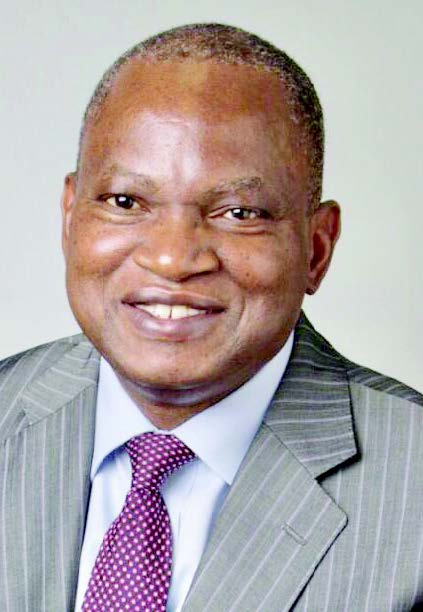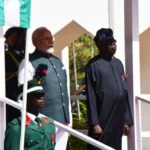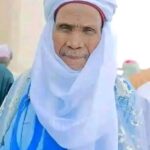Prof Jimmy Adegoke is an award-winning climate scientist and globally recognised environmental leader whose work cuts across science, climate policy and environmental governance among others. He retired from the University of Missouri-Kansas City and is now a senior consultant to AfDB. In this interview, he spoke on the challenges in the fi ght against climate change and proff ers solutions, among others.
What do you consider the most important step for Nigeria to take toward tackling the menace of climate change?
What’s hot at the moment is how to provide support to the government of Nigeria on the important issues around climate change. Th e world is in transition right now from an old fossil fuel-driven economy to a new economy. How do we position ourselves as a country and how do we not just position ourselves, how do we ensure that we are a leading voice in shaping how that transition occurs?
Th is country needs the best that it has. It has to be able to tap into the best of its resources, intellectual resources and capacity, to be able to walk that journey eff ectively. So backstopping (providing critically needed support) to the political class right up to the presidency is the goal here.
So, somebody who is backstopping is somebody that you rely on to give you needed information, critical information when it is needed, the way you need it so that you can be able to put your best foot forward.
Africa is said to suff er the most eff ects of climate change despite contributing little to it, why is it so?
Climate change is a global issue. I have lived in the United States for the last 30 years. Th e Midwest where I live, Missouri, used to get what is called a 100-year fl ood, like once in a long time.
Since 1993, we have had about four or fi ve of those. 1993 is just about 31 years now, and this is linked to the changing climate. Th e same issue that the farmers in the Midwest are facing in terms of this frequent fl ooding situation, massive fl ooding, is exactly what we are facing in Nigeria. We’ve had this, including last year. So I remember in 2014 or 2015, it was a big, massive fl ood across the country.
And since then, we have had several of those big fl oods that cover almost the entire country, what’s the diff erence when we’re talking about vulnerability between our farmers here and say, Midwest farmers? It’s the level of resources, the capacity to absorb those shocks, those impacts and then to deal with them to bounce back.
You need technological, fi nancial and economic resources. Th ose farmers, Midwest farmers, government provides agricultural insurance for them. Th ey have technology and then they have the Federal Emergency Protection Agency, when these things happen, billions of dollars get sent almost immediately.
So those farmers are able to cushion their damage; their loss is mitigated and they’re able to come back in.
We are more vulnerable here because we don’t have those things; our farmers don’t have that backstopping, the support system.
Because, fi rst of all, as rich as we think we are, we don’t have enough money. We don’t have insurance systems that cover all of our farmers because our agriculture is small-scale; how many of our farmers insure their farmlands and their farm operations every year?
So, the instruments available to address these impacts are very limited in Africa, not just in Nigeria. We are even better placed than many African countries. So that is why we say that the impact is more here.
It’s the capacity to deal with the impact that is very low and because of that, the suff ering becomes more pronounced than it normally should be.
As a climate change expert with several researches, what are some of the key fi ndings that you think will help to address climate change?
If you asked me this question, say fi ve years or 10 years ago, I would have said the awareness is limited.
It’s no longer limited, our political class, even in the poorest of countries, now understands and knows, at least they appreciate the basics of the science of climate change.
First of all, you are 100 per cent right that we, in Africa, are not responsible for this changing climate.
We are producing very little of the global greenhouse emissions, about 3%, as you correctly said. So that’s a fact. Now, is the climate changing or not? For us in Africa, it’s no longer waiting for climate change to happen 10 years to 50 years from now, it’s already happening.
We’re already seeing it through these droughts. We just came out of drought events in several parts of Kenya, Somalia, Ethiopia, even Southern Africa. Th ey had fl oods and cyclones last year. Th is year, Zimbabwe, Botswana are dealing with drought events. So climate change, for us, is already happening.
Our leaders know it. And what our science tells us is that it is accelerating. And my message that I think maybe we, if there’s one thing we need to further amplify is the fact that these changes that we’re seeing are not going to let off , unfortunately. Th ey’re going to accelerate.
So the extremes of weather that we have been experiencing, the heavy rainfalls that produce fl ood events, and then the switch, the sudden switch to dry conditions. And then all this, our farmers, now you go to them, what they are used to, people who have farmed for 30, 40 years, in terms of when to expect rain, when it comes, August, for instance, in Nigeria, there’s what we call the August break. It’s not August break anymore.
So, there is an acceleration of the system, the climate system itself. And that is the thing that we need to emphasise to our policymakers.
Th at means that the policy framework and the instruments that we have to address climate change, they are not robust enough. No matter what we think we have now, we’ve got to strengthen them. We’ve got to build stronger resilience infrastructure across all the economy, all aspects of our economy, from agriculture to transportation to water resources, all of those.
If we want to mitigate the suff ering of our people, we have to really fi gure it out, and it’s not something we can do alone. It’s something that we need to intentionally engage with the global community because they have a responsibility.
Talking about responsibility, African countries keep relying solely on donors and the moment these funds stop, the projects stop. How do we address this?
Th e answer is that our political class and governments in Africa have to fi gure out ways to prioritise addressing these issues with some of our own resources as well. While the world has responsibility, we need to hold them accountable to even the promises that they have made.
Since the Paris Accord was put in place, there was the promise of these rich countries providing up to $100 billion. Up to today, as we are speaking now, they haven’t made that commitment. We need to hold them accountable, not just to that, but even to new commitments.
We just made the loss and damage framework that is on the table right now. It still hasn’t been funded. Th ere was a little bit of money that was put in last year, but that is just a drop in the ocean.
Our goal, for instance, in this year’s COP28 is to have a very strong argument, a very strong voice as Africa for resourcing this loss and damage aspect of this new agreement on the table.
But having said that, what our leaders agreed to in multilateral developments, there are a couple of those things that leaders, through the African Union, in terms of what percentage of our budget should go to address environment, agriculture, education and others, we need to be faithful to that.
What is the African Development Bank’s projection on Africa when it comes to fi ghting climate change?
One of the things that the current president of the bank, Dr Akinwumi Adesina, is giving big priority to, is to fi ght climate change on a number of fronts.
Th e fi rst is to strengthen the internal capacity of member countries to do climate change adaptation and have policies in place. We have programmes to help countries develop their national determined contributions, and their long-term policies. Th ose are critical, because you need to understand what is happening to your environment fi rst, and then you need to have a long-term view and policy to do that.
So many African countries have received signifi cant support from the bank to put these policy frameworks in place. Secondly, the sectoral investment that you need in agriculture, water resources and transportation, the bank has been a major investor in those areas, so that we can have a more resilient society.
So when these changes happen, our member countries are better able to respond. Remember we were talking about vulnerability. You are vulnerable because your systems are weak. Your agricultural systems are weak. You don’t have insurance; you don’t have irrigation systems, for instance, in place. You are dependent on just the water that comes from rainfall. So when rainfall doesn’t come, then ‘wahala’ breaks out. So the adaptation investments for resilience are what the bank is doing.
Th e scale of investments that the bank has driven in the last years is not even comparable to anything that the bank has ever done before now. In terms of investments, the actual billions of dollars that are coming into these various sectors to build resilience.
Th en, another major area is attracting external climate fi nance into the continent. Th e bank is at the vanguard of that. We are making the case that the global fi nancial systems, if you look at the billions of dollars that are going to address climate change globally, you know, the portion that comes to Africa.
Meanwhile, as you said, we are the most vulnerable, we need that money more than anybody else. Maybe Asia and maybe South America can make the same argument with us.
But here, you know, yet we are receiving the least amount. So the bank has been playing a very key role under the leadership of Dr Adesina to change that picture. Th e climate change funding has gone from this level to way higher, for example, there’s something that we call the AAAP programme that was recently implemented to mobilise about $25 billion to address climate change in all of those sectors that I just mentioned between now and 2025.
What would be your advice to the Nigerian president on climate change if given the opportunity to see him?
If I was sitting across from the president right now, fi rst of all, we would have done some things right. We have a climate change law that was passed a few years ago and a climate commission that was a major milestone. I could see that there’s a lot of thinking going on in the climate change space.
For those of us who are practitioners at the very high level in this space, I think there is a need for better coordination.
Climate change is a cross-cutting thing. It aff ects agriculture, environment, forestry, water resources, transportation and health, so inter-ministerial coordination is critical.
Th e second thing is our voice is not strong enough in the global space. We are an oil-producing country. We should not be apologetic about that, but the world is also changing, you know.
We have to get ahead of having oil and shape the narrative. And if we can, slow things down also to give us the space that we need, you know, to be able to also build an economy and transform our own economy.
Do we really have what it takes in terms of expertise to fi ght this climate change?
We honestly do, both within the country, maybe not suffi ciently in the country, but if you add the very best capacity of what we have in the country and outside, we have what is needed. Not just for climate change, whether it’s agriculture, whether it’s water resources, whether it’s education, whether it’s health. Some of the best doctors globally are Nigerian doctors in the diaspora.
So what we have to do is be very intentional about leveraging the expertise that we have. Create the space for them, for that expertise to connect with our development agenda.
It is good that we have that diaspora commission, but we have to empower it to create on-ramp opportunities for these people to come into the highway of Nigeria’s Hope agenda so that we can help translate or transform this country from hope to actual achievement.

 Join Daily Trust WhatsApp Community For Quick Access To News and Happenings Around You.
Join Daily Trust WhatsApp Community For Quick Access To News and Happenings Around You.


